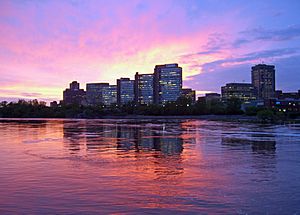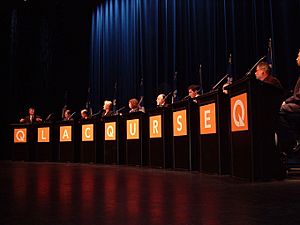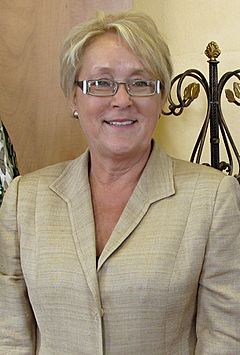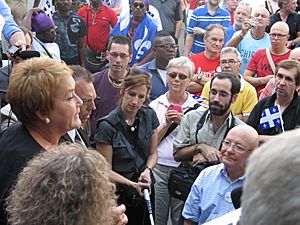Pauline Marois facts for kids
Quick facts for kids
Pauline Marois
|
|||||||||||||||||||||||||||||||||||||||||||||||||||||||||||||||||
|---|---|---|---|---|---|---|---|---|---|---|---|---|---|---|---|---|---|---|---|---|---|---|---|---|---|---|---|---|---|---|---|---|---|---|---|---|---|---|---|---|---|---|---|---|---|---|---|---|---|---|---|---|---|---|---|---|---|---|---|---|---|---|---|---|---|
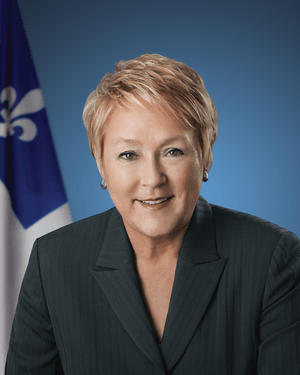
Marois in 2013
|
|||||||||||||||||||||||||||||||||||||||||||||||||||||||||||||||||
| 30th Premier of Quebec | |||||||||||||||||||||||||||||||||||||||||||||||||||||||||||||||||
| In office September 19, 2012 – April 23, 2014 |
|||||||||||||||||||||||||||||||||||||||||||||||||||||||||||||||||
| Monarch | Elizabeth II | ||||||||||||||||||||||||||||||||||||||||||||||||||||||||||||||||
| Lieutenant Governor | Pierre Duchesne | ||||||||||||||||||||||||||||||||||||||||||||||||||||||||||||||||
| Deputy | François Gendron | ||||||||||||||||||||||||||||||||||||||||||||||||||||||||||||||||
| Preceded by | Jean Charest | ||||||||||||||||||||||||||||||||||||||||||||||||||||||||||||||||
| Succeeded by | Philippe Couillard | ||||||||||||||||||||||||||||||||||||||||||||||||||||||||||||||||
| Leader of the Opposition of Quebec | |||||||||||||||||||||||||||||||||||||||||||||||||||||||||||||||||
| In office December 9, 2008 – September 19, 2012 |
|||||||||||||||||||||||||||||||||||||||||||||||||||||||||||||||||
| Preceded by | Mario Dumont | ||||||||||||||||||||||||||||||||||||||||||||||||||||||||||||||||
| Succeeded by | Jean-Marc Fournier | ||||||||||||||||||||||||||||||||||||||||||||||||||||||||||||||||
| Leader of the Parti Québécois | |||||||||||||||||||||||||||||||||||||||||||||||||||||||||||||||||
| In office June 27, 2007 – June 7, 2014 |
|||||||||||||||||||||||||||||||||||||||||||||||||||||||||||||||||
| President |
|
||||||||||||||||||||||||||||||||||||||||||||||||||||||||||||||||
| Preceded by | François Gendron (interim) | ||||||||||||||||||||||||||||||||||||||||||||||||||||||||||||||||
| Succeeded by | Stéphane Bédard (interim) | ||||||||||||||||||||||||||||||||||||||||||||||||||||||||||||||||
| Deputy Premier of Quebec | |||||||||||||||||||||||||||||||||||||||||||||||||||||||||||||||||
| In office March 8, 2001 – April 29, 2003 |
|||||||||||||||||||||||||||||||||||||||||||||||||||||||||||||||||
| Premier | Bernard Landry | ||||||||||||||||||||||||||||||||||||||||||||||||||||||||||||||||
| Preceded by | Bernard Landry | ||||||||||||||||||||||||||||||||||||||||||||||||||||||||||||||||
| Succeeded by | Monique Gagnon-Tremblay | ||||||||||||||||||||||||||||||||||||||||||||||||||||||||||||||||
|
|||||||||||||||||||||||||||||||||||||||||||||||||||||||||||||||||
|
|||||||||||||||||||||||||||||||||||||||||||||||||||||||||||||||||
| Personal details | |||||||||||||||||||||||||||||||||||||||||||||||||||||||||||||||||
| Born | March 29, 1949 Quebec City, Quebec, Canada |
||||||||||||||||||||||||||||||||||||||||||||||||||||||||||||||||
| Political party | Parti Québécois | ||||||||||||||||||||||||||||||||||||||||||||||||||||||||||||||||
| Residences | Old Montreal and Charlevoix | ||||||||||||||||||||||||||||||||||||||||||||||||||||||||||||||||
| Occupation |
|
||||||||||||||||||||||||||||||||||||||||||||||||||||||||||||||||
Pauline Marois (born March 29, 1949) is a Canadian politician who is now retired. She served as the 30th premier of Quebec from 2012 to 2014. Before becoming Premier, Marois was a member of the National Assembly (MNA) for different areas since 1981. She was also the leader of the Parti Québécois (PQ) from 2007 to 2014. Pauline Marois made history as the first female premier of Quebec.
Marois grew up in a working-class family. She studied social work at Université Laval and became involved in community groups and the Parti Québécois. This party supports Quebec's independence. She first became an MNA in 1981. At 32, she was appointed to the government's cabinet for the first time.
After a short break from politics, she was elected again as an MNA in 1989. When the PQ returned to power in 1994, she held important roles in the Quebec government. She helped create policies for public education, changed how university tuition worked, and started a program for affordable daycare. She also helped reduce Quebec's debt. In 2001, she became the Deputy Premier of Quebec, a very high position.
After trying twice before, Marois became the leader of the Parti Québécois in 2007. From 2008 to 2012, she was the leader of the Official Opposition. Despite some challenges to her leadership, she led the Parti Québécois to win the 2012 Quebec general election. This made her the first woman to be Premier of Quebec.
As Premier, Marois closed Quebec's only nuclear reactor and stopped asbestos production. Her government also proposed a Quebec Charter of Values. This idea would have prevented government employees from wearing religious symbols. Her party lost the 2014 Quebec general election that she had called. Marois also lost her own seat in the election and then resigned as PQ leader.
Contents
Early Life and Education
Growing Up in Quebec
Pauline Marois was born on March 29, 1949, in Quebec City. She was the oldest of five children. Her father was a mechanic, and her mother stayed at home. She grew up in a small brick house built by her father in Saint-Étienne-de-Lauzon. This village is now part of the city of Lévis, across the Saint Lawrence River from Quebec City.
Marois remembers her parents as being supportive of Quebec and religious, but not very involved in politics. Her father wanted his children to get a good education. All five children, including Pauline, went on to earn university degrees.
She first went to a small local school. At age 12, she started attending Collège Jésus-Marie de Sillery. This was a private Catholic school for girls from wealthier families. Marois felt a "culture shock" there, as she became aware of her family's lower social status. She sometimes helped her mother clean houses to pay for her tuition.
University Studies
In 1968, Marois began studying social work at Université Laval in Quebec City. At that time, she was more interested in helping poor people and international issues than in Quebec's independence. She even took part in protests against the Vietnam War.
In 1969, she married Claude Blanchet, her high school sweetheart. He was studying business. In 1970, she had an internship in Hull (now part of Gatineau). She helped create a consumer advocacy group there. This experience made her feel more strongly about being a Quebecer.
Early Career and First Steps in Politics
Community Work and Government Roles
After university, Marois worked with several community groups. She also taught social work for a while. Later, she became the CEO of a local health and social services center (CLSC). She also volunteered for the Parti Québécois.
In 1978, Marois joined the office of the Minister of Finance, Jacques Parizeau. She then worked for Lise Payette, the minister responsible for women's issues. Payette encouraged Marois to become more involved in politics and women's rights.
Becoming a Minister
In 1981, Marois decided to run for the Parti Québécois in the 1981 Quebec general election. She won her election in the La Peltrie area. She was one of only eight women elected that year. Just 11 days after becoming an MNA, she gave birth to her second child.
Soon after, she joined the government of Premier René Lévesque. At 32, she became the Minister for the Status of Women. Later, she was promoted to Minister of Labour and Income Security.
After Lévesque resigned in 1985, Marois ran for the leadership of the Parti Québécois. She finished in second place.
Return to Politics and Key Roles
Back in the National Assembly
After losing her seat in the 1985 election, Marois worked with feminist groups. She also lectured at Université du Québec à Hull.
In 1989, she was elected again as an MNA for the Taillon area. This area had once been represented by René Lévesque. She became an important member of the opposition, focusing on industry, trade, and public administration.
"Minister of Everything"
After being re-elected in 1994, Marois became one of the most important ministers in the Parti Québécois governments. She served under Premiers Jacques Parizeau, Lucien Bouchard, and Bernard Landry. Over nine years, she held many key positions, including Finance, Education, and Health. She is the only Quebec politician to have held all three of these major roles.
- As Minister of Education, she helped change the public school system.
- She also introduced a popular program for affordable daycare, costing $5 a day, in 1997.
- She worked to reduce Quebec's debt under Premier Bouchard.
- From 1998 to 2001, she was Minister of Health.
- In 2001, Premier Landry named her Deputy Premier and Minister of Finance.
By 2003, she had held 15 different government ministries.
Leadership Races and Retirement
After the PQ lost the 2003 election, Marois ran for the party leadership again in 2005. She came in second place.
In March 2006, Marois decided to leave politics after 25 years. She said she wanted to pursue other interests but would remain active in the Parti Québécois.
Leader of the Parti Québécois
Becoming Party Leader
After the Parti Québécois had a disappointing election result in 2007, their leader resigned. Pauline Marois announced she would run for leader for the third time. No one else ran against her, so she became the leader on June 27, 2007.
She did not have a seat in the National Assembly at first. She ran in a special election in the Charlevoix area and won on September 24, 2007. This allowed her to enter the National Assembly as the party leader.
Marois stated that holding a referendum on Quebec's independence would not be her main goal right away.
Leading the Opposition
In 2008, an election was called in Quebec. The Parti Québécois campaign gained strength after Marois's performance in a televised debate. The PQ won 15 more seats in the National Assembly, becoming the official opposition. Marois became the first woman to lead the Official Opposition in Quebec.
Marois and her team strongly questioned the government about accusations of corruption and illegal political funding. This led to a public inquiry being set up in 2011.
Premier of Quebec
Winning the 2012 Election
On September 4, 2012, Pauline Marois won the election and was elected in the Charlevoix–Côte-de-Beaupré area. She was sworn in as Premier of Quebec on September 17, becoming the first woman to hold this position.
Her party won 54 out of 125 seats, forming a minority government. This means they had the most seats but not enough to pass laws without support from other parties. As Premier, Marois quickly acted on her campaign promises. She cancelled increases in student tuition fees and electricity rates. She also stopped a loan for an asbestos mine and ended a nuclear power plant project.
| Quebec general election, 2012: Charlevoix–Côte-de-Beaupré | ||||||||
|---|---|---|---|---|---|---|---|---|
| Party | Candidate | Votes | % | ±% | ||||
| Parti Québécois | Pauline Marois | 15,472 | 40.65 | |||||
| Liberal | Claire Rémillard | 10,301 | 27.06 | |||||
| Coalition Avenir Québec | Ian Latrémouille | 10,203 | 26.80 | |||||
| Québec solidaire | André Jacob | 1,227 | 3.22 | |||||
| Option nationale | Pierre Tremblay | 619 | 1.63 | |||||
| Coalition pour la constituante | Daniel Laforest | 243 | 0.64 | |||||
| Total valid votes | 38,065 | 98.82 | ||||||
| Total rejected ballots | 456 | 1.18 | ||||||
| Turnout | 38,521 | 75.95 | ||||||
| Electors on the lists | 50,717 | – | ||||||
Events During Victory Speech
While Marois was giving her victory speech at the Métropolis in Montreal, an incident occurred. A man tried to enter the venue and shot a technician, who sadly died. Another technician was injured. Security guards quickly moved Marois away from the stage. A few minutes later, she returned to calm the crowd.
Her Time as Premier
Marois's government focused on promoting Quebec's identity and managing the province's finances. They aimed to balance the budget by slowing down public spending. They also increased taxes on tobacco and alcohol.
Her government also introduced new rules for government contracts and political financing. These rules aimed to make sure that government contracts were fair and that political parties were funded mostly by public money, limiting large private donations.
The 2014 Election and Resignation
On March 5, 2014, Marois called for a new election. She ran as the leader of the Parti Québécois in her home riding of Charlevoix-Côte-de-Beaupré.
Early in the campaign, polls showed Marois and her party in the lead. However, support for the PQ dropped after a well-known media businessman joined the party. His past actions and his call for another referendum on Quebec independence seemed to turn off many voters.
| Quebec general election, 2014: Charlevoix–Côte-de-Beaupré | ||||||||
|---|---|---|---|---|---|---|---|---|
| Party | Candidate | Votes | % | ±% | ||||
| Liberal | Caroline Simard | 13,083 | 35.24 | +8.18 | ||||
| Parti Québécois | Pauline Marois | 12,201 | 32.87 | -7.78 | ||||
| Coalition Avenir Québec | Ian Latrémouille | 9,682 | 26.08 | -0.72 | ||||
| Québec solidaire | Jean-Yves Bernard | 1,539 | 4.15 | +0.93 | ||||
| Conservative | Chantal Mélançon | 332 | 0.89 | – | ||||
| Option nationale | François Thériault | 287 | 0.77 | -0.86 | ||||
| Total valid votes | 37,124 | 98.74 | – | |||||
| Total rejected ballots | 472 | 1.26 | – | |||||
| Turnout | 37,596 | 73.48 | -2.47 | |||||
| Electors on the lists | 51,165 | – | – | |||||
On April 7, 2014, Marois's government was defeated. The Liberal Party won a majority government. The Parti Québécois had its worst election result since 1970. Pauline Marois also lost her own seat in Charlevoix-Côte-de-Beaupré.
In her speech after the election, Marois resigned as the leader of the Parti Québécois.
Key Issues and Policies
Quebec Identity and Language
In 2007, Marois proposed a bill called the Quebec Identity Act. This bill suggested that immigrants should learn French to gain certain rights, like being able to run in elections. It also stated that Quebec's main values, such as equality between genders and the importance of French, should be part of a future constitution.
This idea received mixed reactions. Some groups criticized it, while others supported it. In 2008, Marois also proposed changes to Bill 101, the Charter of the French Language. These changes aimed to strengthen the use of French in schools and businesses.
Quebec Charter of Values
As Premier, Marois's government proposed a Quebec Charter of Values. This proposal would have banned government employees from wearing religious symbols like turbans, Islamic veils, and Jewish kippahs. However, a crucifix hanging in the provincial legislature would not have been banned.
This proposal caused a lot of discussion and criticism. Many people, including academics and some politicians, felt it was unfair and would alienate immigrant groups. Some hospitals also spoke out against it, saying it would force many of their staff to leave their jobs.
In 2013, Marois supported a ban on turbans in soccer games by the Quebec Soccer Federation. This led to the Canadian Soccer Federation suspending the Quebec federation.
International Relations
Marois also took part in international affairs as Premier. In 2012, she attended the Francophonie Summit in Kinshasa. She also visited New York City and attended the World Economic Forum in Davos. These trips were to meet with investors and political leaders from around the world.
Personal Life
Pauline Marois is married to Claude Blanchet. They have four children: Catherine, Félix, François-Christophe, and Jean-Sébastien.
Marois is an atheist.
Honours
In 2019, she received an honorary doctorate from the Université du Québec en Outaouais.
See also
 In Spanish: Pauline Marois para niños
In Spanish: Pauline Marois para niños
 | Bayard Rustin |
 | Jeannette Carter |
 | Jeremiah A. Brown |


